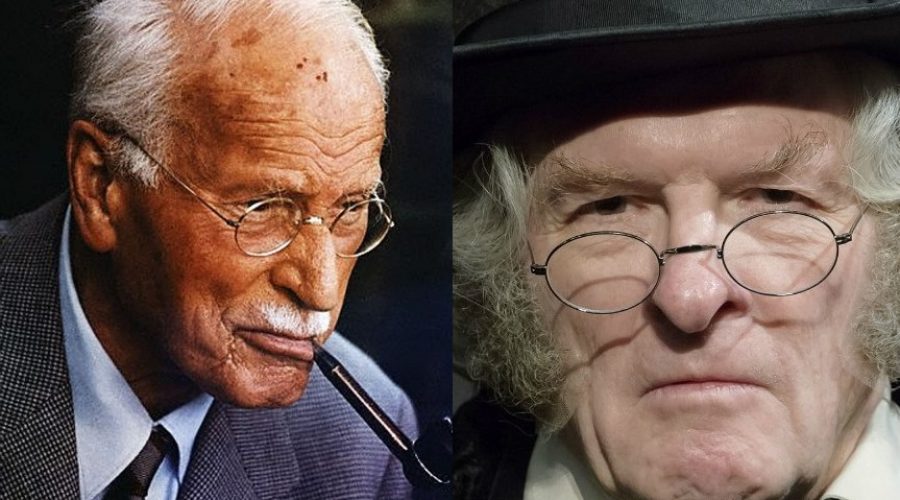Ebenezer Scrooge, the curmudgeonly, compulsive money hoarder and eventual hero of Charles Dickens’ A Christmas Carol, had some really disturbing dreams the other night. He dreamt he was visited by a ghastly ghost of his former business partner, and by the spirits of Christmas past, present and future, accusing him of being, well, Scrooge. It was enough to frighten him into getting help to understand what the dreams meant. So he pays a visit to the famous psychiatrist Carl Jung, known for his uncanny ability to interpret dreams.
Here’s what Jung had to say:
Scrooge’s Shadow Seen in A Ghost
“Now look here,” Jung tells Scrooge after listening to his dreams, and as usual pulling no punches, “you’ve got to take these dreams seriously. You got off track a long time ago and these dreams are trying to set you right. And if you don’t, you’re in for big trouble. These characters in your dreams are parts of you that you’ve wanted to ignore. They’re haunting you for a reason.”
Scrooge squirms in his seat.
“This fellow Marley, your deceased partner and the only friend you ever had, shows up as the walking dead clothed in chains. His appearance as a ghost shows what you don’t want to acknowledge about yourself, your shadow. You like to think that you’re free of all the foolishness of the rabble, but you’re really psychologically dead and weighed down by the chains of your own foolish love of money, and the desperate need to control that comes with it. You think you’re smarter than everyone else, but your unconscious is showing that you’ve got your problems too.
Scrooge looks at him like a puppy hoping desperately for a hug.
Missing The Feminine, Beauty, and Meaning
“This young lady Belle, yes, the one that you fell in love with, she left you when your love of money outstripped your love for her. At that point you lost not just her, but your own soul, your own feminine side, the side that appreciates feeling and connection with other people.”
“And remember, Belle means beauty. When was the last time you stopped to appreciate something beautiful?”
Scrooge looks down at the floor, blank and ashamed.
“Right. Just what I thought. You had this idea that you’d provide well for her. But you lost track of what and who you were so driven to provide for, and money became your god. You forgot what was important.”
“Of course you chose money over people. Given what you went through people felt undependable to you and it seemed like you could rely much more safely on money. It’s understandable, but it won’t do. You can’t live alone and stay sane.”
Scrooge nods sadly. 
Tolerating Too Much Misery
“And this little fellow Tiny Tim. He’s your own wounded, inner child and he’s about to die. I won’t bother asking you when the last time you had any fun was. I suspect that you project all of your disowned desires onto the poor folk who enjoy a dance or two.”
This is harder for Scrooge to swallow, but he’s willing to consider it.
“Dreams don’t tell us what will happen. They tell us what could happen. The real danger for you is that your cynicism blocks any change you might be inspired to make while you’re frightened. It shows all too well in your disdain for Christmas, your scorn for the possibility of something new coming into the world, and for light coming out of the darkness. You compulsives tolerate far too much unhappiness.”
What’s It All For?
“I see that these dreams have frightened you to death and you’re ready to change. But beware falling back into your old habits once the new fear wears off and the deeper, older fears of being let down by people come back.”
“You have a compulsive personality, and you have great potential because of that. You’ve got a lot to give: money, drive, energy, and talent. I suggest that you recall what these were originally meant for, and go use them for something worthwhile. Do that and I promise these ghosts won’t disturb you any more.”
Scrooge brightens up, and, cautiously optimistic, shakes Jung’s hand as he leaves. He walks out visibly encouraged and a little wiser.
Patron Saint of Compulsives and Symbol of Transformation
A Christmas Carol must be the most obvious morality play ever to knock on our door. But despite its obviousness, the story continues to draw us. It’s archetypal. It tells the story of transformation that occurs when we listen to what the unconscious tells us through dreams and other signals.
And Scrooge stands as a symbol of that. I think we should make him the patron saint of compulsives because he started at the extreme unhealthy end of the compulsive personality spectrum, and moved to the healthy side. He learned to share his psychological resources instead of hoarding them, to use them for good rather than just to shore up his insecurity.
If we can see beyond Scrooge the caricature, we might see that in some small way we might be like Scrooge. We might not necessarily hoard money as he did, but we may withhold other things needlessly, such as joy, compliments, hope, rest, play, or compassion.
Dreams are just one way that Psyche speaks to us. Change can also come about by listening to our moods as if they were cautionary dreams. For example, depression can be Psyche’s way to compensate for trying too hard to control, it forces us to let go and give up on unrealistic expectations–for ourselves and others.
As Jung said, the human psyche is self-regulating–if we listen to it. And that’s just what Scrooge did.
Discover more from The Healthy Compulsive Project: Help for OCPD, Workaholics, Obsessives, & Type A Personality
Subscribe to get the latest posts sent to your email.





1 Comment
Leave your reply.